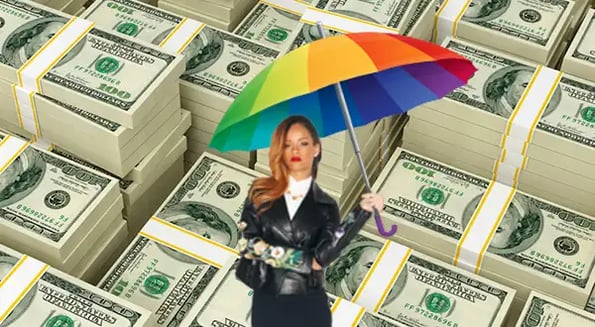Last week, LVMH Möet Hennessy Louis Vuitton added Fenty — Rihanna’s beauty line — to its group of luxury brands. The partnership makes Fenty LVMH’s first new in-house brand to debut since 1987 — and makes Rihanna the first female partner to launch an LVMH brand.

Following in the footsteps of other famous fashionistas like the Kardashian-Jenners, Rihanna’s partnership proves that, in the influencer age, personal brands can become big businesses.
Fenty’s fast and fashionable rise
Rihanna created Fenty with the goal of providing more inclusive cosmetics options, raising $10m from Kendo (LVMH’s cosmetics incubator) to get the business off the ground.
After launching in 2017 with 40 different skin tones, Fenty brought in more than $550m in revenue in its first year.
Fenty’s massive success inspired LVMH to invite outsider Rihanna to launch a new brand under the luxury company’s ultra-exclusive corporate umbrella (ella, ella, eh, eh, eh — sorry).
Rihanna, who will be the first woman of color to run an LVMH line, will own 49.99% of the company.
Buying new followers with old money
The LVMH-Fenty collaboration is a collision of old and new: LVMH has called its brands “maisons” since it fabricated clothes for French aristocrats in their homes (“maisons,” en français); Rihanna has “Thug Life” tattooed on her knuckles.
But, even though LVMH did more than $14B in revenue last quarter, the luxury conglomerate doesn’t have as much influence with young, fashionable consumers as Rihanna — who has 70m Instagram followers.
The evolution of celeb-preneurship
For decades, celebrities — mostly men like Paul Newman or George Clooney — have parlayed newsworthy names into successful side hustles, usually by launching kitschy alternatives to big brands.
But a new generation of celebrities — mostly women like Gwyneth Paltrow, Kylie Jenner, and Kate Hudson — is transforming star power into sales power and building billion-dollar businesses that actually threaten the big brands.
Now, stuffy old companies like LVMH are actively seeking out partnerships with celebrities like Rihanna to capitalize on their influence: When Rihanna recently partnered with Puma for a sneaker collaboration, the company’s footwear sales increased 23%.

